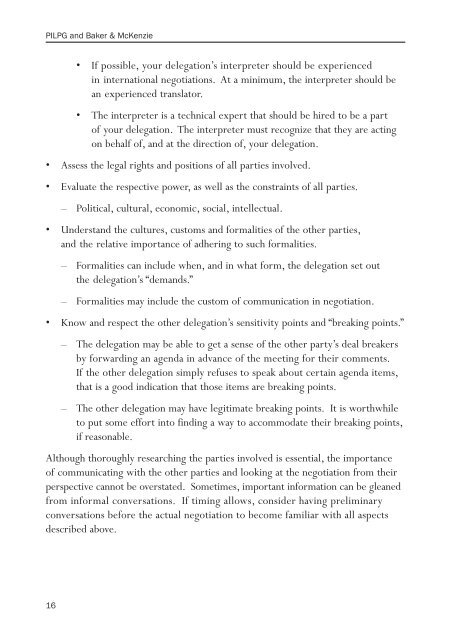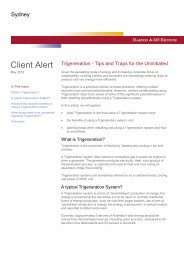The International Negotiations Handbook - Baker & McKenzie
The International Negotiations Handbook - Baker & McKenzie
The International Negotiations Handbook - Baker & McKenzie
Create successful ePaper yourself
Turn your PDF publications into a flip-book with our unique Google optimized e-Paper software.
PILPG and <strong>Baker</strong> & <strong>McKenzie</strong><br />
• If possible, your delegation’s interpreter should be experienced<br />
in international negotiations. At a minimum, the interpreter should be<br />
an experienced translator.<br />
• <strong>The</strong> interpreter is a technical expert that should be hired to be a part<br />
of your delegation. <strong>The</strong> interpreter must recognize that they are acting<br />
on behalf of, and at the direction of, your delegation.<br />
• Assess the legal rights and positions of all parties involved.<br />
• Evaluate the respective power, as well as the constraints of all parties.<br />
– Political, cultural, economic, social, intellectual.<br />
• Understand the cultures, customs and formalities of the other parties,<br />
and the relative importance of adhering to such formalities.<br />
– Formalities can include when, and in what form, the delegation set out<br />
the delegation’s “demands.”<br />
– Formalities may include the custom of communication in negotiation.<br />
• Know and respect the other delegation’s sensitivity points and “breaking points.”<br />
– <strong>The</strong> delegation may be able to get a sense of the other party’s deal breakers<br />
by forwarding an agenda in advance of the meeting for their comments.<br />
If the other delegation simply refuses to speak about certain agenda items,<br />
that is a good indication that those items are breaking points.<br />
– <strong>The</strong> other delegation may have legitimate breaking points. It is worthwhile<br />
to put some effort into finding a way to accommodate their breaking points,<br />
if reasonable.<br />
Although thoroughly researching the parties involved is essential, the importance<br />
of communicating with the other parties and looking at the negotiation from their<br />
perspective cannot be overstated. Sometimes, important information can be gleaned<br />
from informal conversations. If timing allows, consider having preliminary<br />
conversations before the actual negotiation to become familiar with all aspects<br />
described above.<br />
16

















